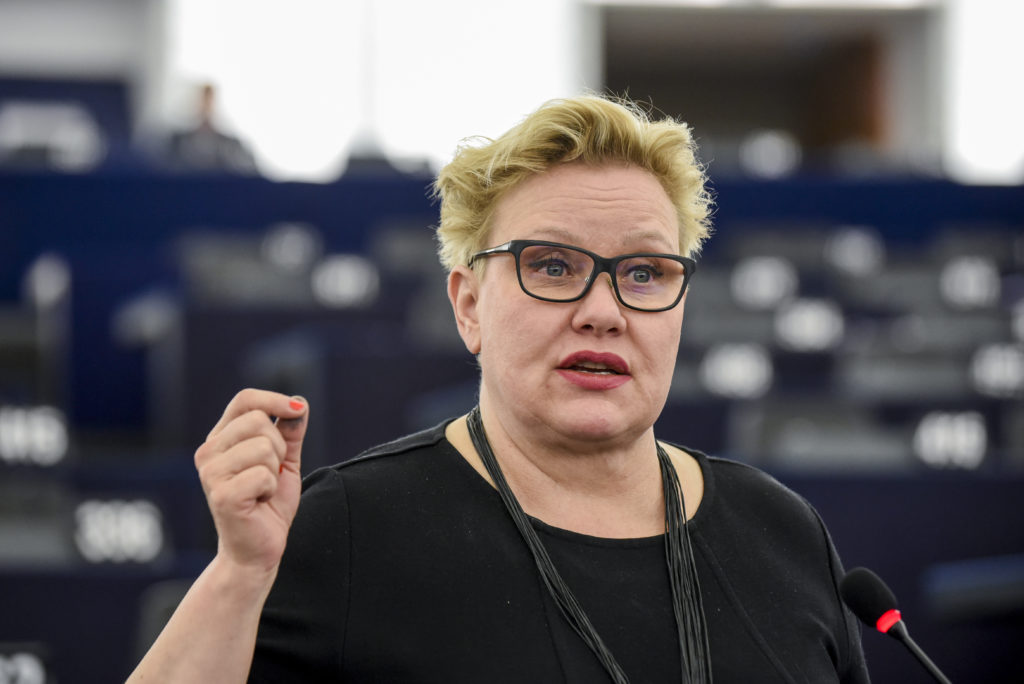12.05.2017 - 16:43
|
Actualització: 16.05.2017 - 16:45
MEPs from different parties have criticized the way the Spanish State has used the court to tackle Catalonia’s pro-independence aspirations, particularly this week as the Parliament’s President, Carme Forcadell, and other members of the Chamber’s Bureau have been brought to court for allowing a debate on independence in the Parliament. According to Sinn Féin’s MEP, Matt Carthy, the Spanish State is “undermining its reputation across Europe” by taking public representatives to court. In a similar vein, European People’s Party MEP, Sipra Pietikäinen, said the reaction from the Spanish judiciary was “very strong” and called for “mediation” instead to overcome the current deadlock. Slovenian MEP Igor Soltes also criticized the EU role regarding these kinds of conflicts and lamented that “sometimes it is easier” for EU institutions to intervene “in foreign countries” such as Venezuela rather than doing so in Catalonia.
Although she admitted “sympathizing and understanding” the Spanish State’s fears regarding a “unilateral declaration of independence” in Catalonia, EPP MEP, Sipra Pietikäinen, considered the Spanish executive’s decision to prosecute Forcadell and other members of the Parliaments “extremely harsh”. “This is the Europe of regions; we should encourage their strong role and try to mediate in these kinds of conflicts,” she said and opted for “dialogue, definitely” as the only way to overcome the current deadlock between Catalonia and Spain.
Slovenian MEP Igor Soltes emphasized “how difficult it is” to get the EU institutions “more involved” in Member State issues. “Sometimes it is easier to intervene and to give an opinion on foreign countries, such as African countries or Venezuela” rather than interfering in problems “which have to do with the EU countries themselves,” he said. According to Soltes, Spain’s judicialization of polítics “mirrors” how the Spanish State “sees democracy”. “I think we have to talk about it,” he said and added that Catalonia’s independence “is not a secret”, on the contrary; it is “one of Europe’s problems” and therefore should be discussed in the European Parliament as well.
In a similar vein, Helga Stevens, a European Conservatives and Reformists MEP and a candidate to substitute Martin Shulz at the helm of the EU Parliament, considered that the prosecution of Forcadell and the rest of the Parliament Bureau is “the wrong way to proceed”. “If she is the Parliament’s President, it is because the citizens have chosen her,” said Stevens, adding that political conflicts must be solved “through dialogue” and not “in the courts”. The Belgian politician from the New Flemish Alliance (N-VA) urged the EU institutions to be “consistent” in how they address self-determination processes, without making “distinctions” between Northern Ireland, Scotland, or Flanders.
“The Spanish State is doing a serious injustice to itself and to its people, undermining their own reputation across Europe,” said Sinn Féin MEP, Matt Carthy. “This is about democracy and the citizens’ right to assert their own process of self-determination,” he added. According to Carthy it is “very strange” for the EU to talk about Northern Ireland or even Scotland but refuse to talk when it comes to Catalonia. Although he defends the position that it is for Catalans to decide whether they want to become independent or not, “the EU also has a responsibility” and it has to “defend their right” to choose their political future.



